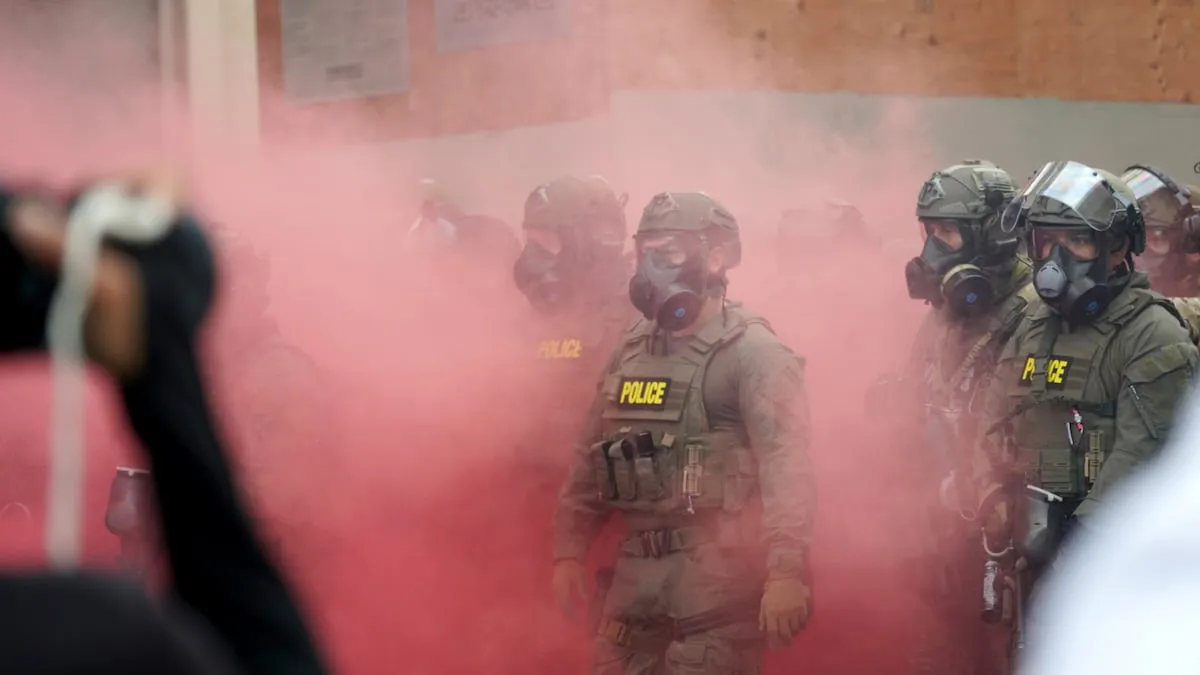
The latest chapter in the contentious debate regarding President Trump's authority to deploy National Guard troops in Portland now hinges on the decisions of the 9th U.S. Circuit Court of Appeals. Legal experts anticipate a swift resolution, echoing a similar case that unfolded in California earlier this year. The Trump administration contends that a federal judge improperly challenged the military decisions made by the Commander in Chief when she blocked the deployment of National Guard troops through a series of weekend orders.
In an appeal submitted on Sunday, the Trump administration reiterated arguments previously presented but dismissed by U.S. District Judge Karin J. Immergut. The administration argues that the ongoing protests at a U.S. Immigration and Customs Enforcement (ICE) facility represent a rebellion that jeopardizes public order. “The order imposes irreparable harm by impinging on the ability of the President and the Secretary of War to use the National Guard to protect federal officials enforcing federal law,” states the motion filed by the administration.
On Monday, Trump’s press secretary, Karoline Leavitt, conveyed her disapproval of the judge's ruling, asserting, “With all due respect to that judge, I think her opinion is untethered in reality and in the law.” She emphasized that the president is exercising his authority as Commander in Chief.
The appeal was prompted by Judge Immergut's issuance of a temporary restraining order, which halted the Trump administration's plans to deploy Oregon National Guard troops to Portland. This order was later expanded to include National Guard members from other states, following Trump's indication that he would send troops from California and Texas. The U.S. Department of Justice (DOJ) is now requesting that the appeals judges render this order moot while they arrange a hearing to assess its legality.
As previously argued in lower courts, the federal DOJ maintains that protests in Portland have involved property damage and present safety threats to federal officers stationed at the ICE facility. Although the Trump administration claims that “violence has somewhat abated in the last month,” they argue that they have had to reassign 115 officers to the building, thereby straining resources elsewhere.
In contrast, attorneys representing the state and city of Portland have characterized Trump’s actions as part of a broader campaign to integrate the military into civilian law enforcement. Oregon Governor Tina Kotek expressed hope for a resolution grounded in the rule of law, stating, “I assume that those hearings will start shortly and we’ll be watching... I think this is a wake-up call for every state.”
The city and state contend that the reality on the ground in Portland is far less chaotic than the “war-ravaged” scenario painted by Trump. Judge Immergut, who was nominated by Trump in 2018 and confirmed in 2019, echoed this sentiment in her ruling. Although protests caused damage to the ICE building in June, the recent demonstrations have typically involved only a small number of protesters and minor skirmishes with federal troops.
The city and state argue that the current conditions do not satisfy the legal criteria for federalizing National Guard members. They assert, “Defendants’ interpretation of the law would empower the President to commandeer a state’s National Guard whenever members of the public merely opposed his authority.” This unchecked authority could potentially be exploited by any future president, not just in response to immigration enforcement protests.
Disagreements also persist regarding whether Portland police have adequately addressed assaults or property damage near the ICE facility. The Portland Police Bureau reported 36 arrests since the onset of nightly protests in June but noted that the department had to increase its presence in light of Trump’s National Guard call-up, incurring nearly $100,000 in overtime costs in just three days.
The nature of Judge Immergut’s order—lasting only 14 days and subject to extension—means that appeals court judges may find it challenging to evaluate the legality of her ruling. With the appeals court poised to act, similarities to a previous case involving the California National Guard are notable. In that instance, a three-judge panel acted quickly to block a judicial order that would have prevented military deployment, resulting in the dispatch of thousands of National Guard members to Los Angeles amid violent protests.
The Trump administration contends that the situation in Portland mirrors that of California, asserting, “This is far from ‘categorically different from the violent incidents’ in California that justified the federalization of the California Guard.” They cite Immergut’s ruling as evidence of the perceived threats against federal personnel.
However, attorneys representing the state of Oregon and the city of Portland argue that the conditions in Los Angeles were markedly different, with reports of violent acts including Molotov cocktails and aggressive confrontations with federal officers. They argue, “Congress never intended that relatively small, contained, and largely sedate protests would justify military intervention.”
As the 9th Circuit Court deliberates on this critical issue, 200 Oregon National Guard troops previously under Pentagon control have reverted back to the authority of Governor Tina Kotek, further complicating the unfolding legal drama.